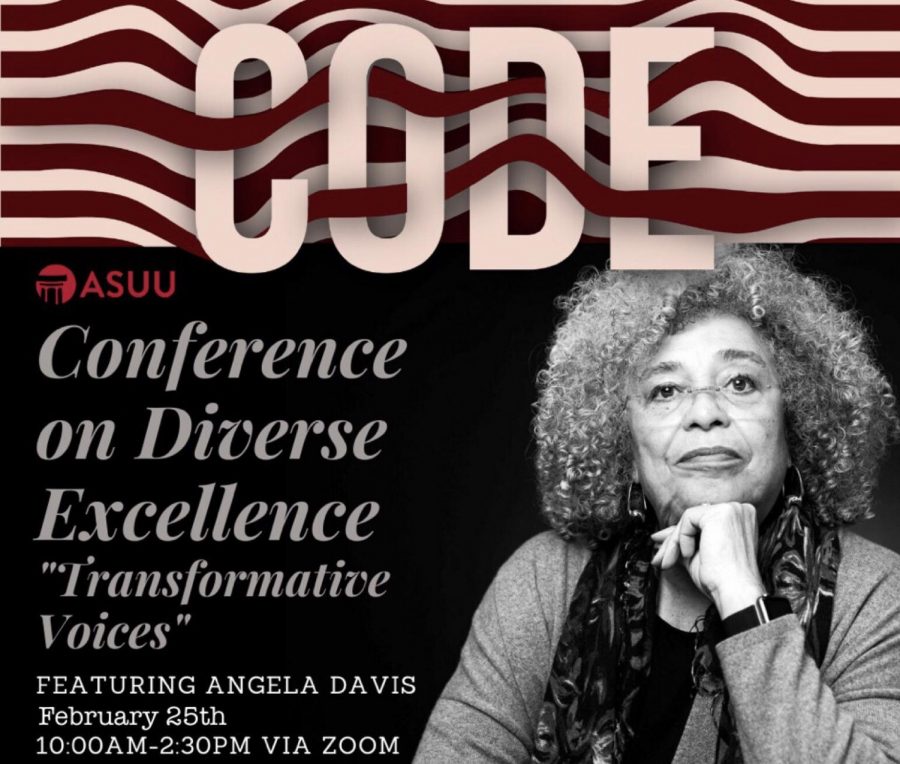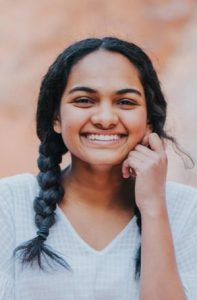Saifee: Dr. Angela Davis is the Transformative Voice We Need at the U
February 23, 2021
Every year in February, ASUU’s Diversity Board hosts the Conference on Diverse Excellence. CODE’s mission is to educate and provide spaces for conversations centered around uplifting marginalized communities. It’s designed to engage students in thought-provoking workshops and give us the tools to be better social justice advocates. In previous years, CODE has brought in Tan France and Jesse Williams as keynote speakers. This year, Dr. Angela Davis will speak on the 2021 CODE theme: “Transformative Voices.”
ASUU Diversity Director Ermiya Fanaeian and Associate Directors Krystal Bustamante and Cherifa Bassa have been planning this event since August. They are excited about the knowledge and perspective Davis will bring to campus given her history with justice movements and Black upliftment. In an interview, Fanaeian said, “Dr. Davis is our person and her teaching is exactly what this campus needs.” I can’t wait for CODE, and I encourage you to attend as well.
Davis is a celebrated activist who was heavily involved in the Civil Rights Movement in the 1960s and 1970s. She was a member of the Black Panther Party and Che-Lumumba Club whose activism started at UCLA — on a college campus. “We see that same passion on our campus,” Fanaeian said. “Students are voicing their opinions against the administration’s decisions in regards to safety and campus policing. Davis represents a person who stood up for her beliefs and stood up to people in powerful positions.”
Davis has dedicated her life to racial justice advocacy and the upliftment of vulnerable communities. She sits at the intersection of the Black Lives Matter, prison abolition and feminist movements. The U will benefit from her unique experiences and perspectives as we continue working towards an equitable campus and just future.
The U is a predominantly white institution, and Utah is a predominantly white state. These demographics lead to the minimization of minority voices. People of races, cultures and religions outside the Utah majority may feel isolated here. Worse, our campus has been the site of racist vandalism and other hateful acts in the past, proving that there is still work needed at the U to cultivate respect and understanding among people with different identities.
We’re not alone, though. Last summer, America was reminded of the racism that persists within our social, political and economic systems. Police departments across the country have proven to be corrupt and oppressive to people of color and other marginalized groups. On our campus, students are familiar with the inadequacies of the police force. The UUPD has demonstrated time and again that they do not contribute to our safety but rather make students, especially those of marginalized identities, feel less safe. Fanaeian believes that our campus is in the middle of a crucial transition period and that we need less money poured into UUPD and more into campus resources that support students. “Funds should be going to the supporting student healthcare, housing security, LGBTQIA+ folks and offices like the Black Student Union, Women’s Resource Center and the McCluskey Center for Violence Prevention. Funds should be redistributed so the campus is accessible, safe and equipped with all the resources for students to succeed.”
Davis will be stepping into that context to talk about experiences that few of us have faced ourselves. Her talk will challenge many of our opinions and assumptions — but we shouldn’t shy away from different perspectives or hard conversations. We grow and become more compassionate human beings when we learn from people with different ideas. Hopefully, Davis’s talk will be a springboard for discussions and policies that promote more diverse thought and intersectional voices on campus.
Of course, Davis’s participation at CODE will not be a catch-all solution to the U’s shortcomings, but it will be a powerful learning opportunity that could carve a pathway to a more just campus. Anti-racism is a continual effort. We must continue to educate ourselves and hold ourselves and others accountable — so tune in on Thursday, Feb. 25 to learn from Davis and continue the conversation about racial equity and a transformative future at the U.








